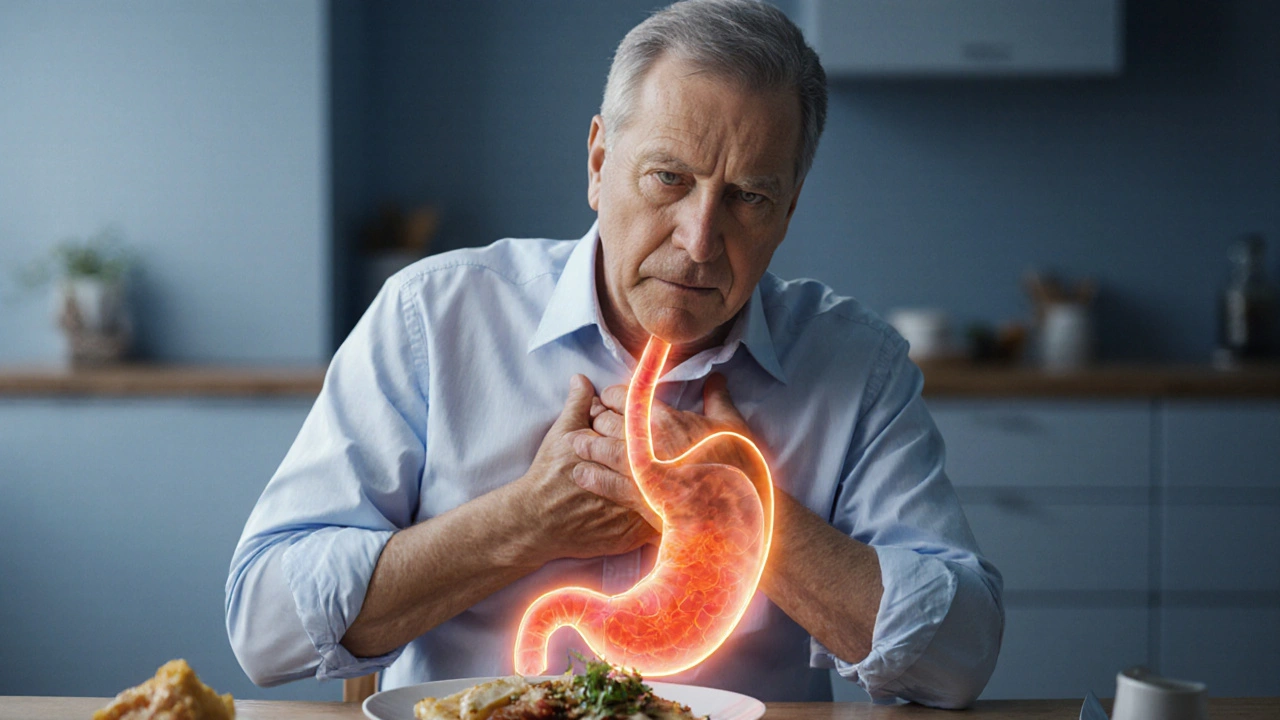Heartburn vs Heart Attack: Spot the Difference
When you feel a tight knot in your chest, the first question is often heartburn vs heart attack. heartburn vs heart attack is the comparison of two conditions that share similar discomfort but demand completely different responses. It helps you decide whether to reach for an antacid or call 911. Also known as chest‑related confusion, this comparison guides you through symptoms, risk factors, and immediate actions.
Key Differences at a Glance
Acid reflux is the backflow of stomach acid into the esophagus, causing a burning sensation behind the breastbone. It often worsens after meals, when lying down, or after spicy drinks. This condition is the main driver of heartburn, and it can be managed with lifestyle tweaks and medications like proton‑pump inhibitors. By contrast, myocardial infarction is the death of heart muscle due to blocked blood flow. It demands immediate emergency care, usually involving clot‑busting drugs or cardiac catheterization.
Both conditions can present as chest pain, but the quality of that pain differs. Acid reflux typically produces a sour, burning feeling that may radiate upward toward the throat and improve with antacids. Myocardial infarction generates a pressure‑like, squeezing pain that can radiate to the left arm, jaw, or back and does not ease with over‑the‑counter meds. Understanding that chest pain can be a symptom of both heartburn and a heart attack is a core semantic triple that shapes how you react.
Triggers also tell the story. Heavy meals, alcohol, caffeine, and tight clothing often provoke heartburn, while intense physical exertion, emotional stress, or sudden cold exposure can tip a vulnerable heart into an attack. Lifestyle habits matter: maintaining a healthy weight, avoiding late‑night snacking, and quitting smoking lower the risk of both acid reflux and coronary artery disease. This link between lifestyle and disease forms another semantic connection: "Healthy habits reduce the likelihood of both heartburn and heart attack."
When you’re unsure, follow a simple decision tree. If the pain starts after a big dinner, improves with sitting up, or is accompanied by a sour taste, it leans toward heartburn. If the discomfort appears at rest, intensifies with deep breaths, spreads to the arm or jaw, or is paired with shortness of breath, nausea, or cold sweats, treat it as a possible heart attack and call emergency services right away. This rule‑of‑thumb triple—"Heart attack requires immediate medical attention, heartburn can often be self‑treated"—helps you act quickly.
Diagnosis tools reinforce the distinction. An over‑the‑counter antacid test (taking an antacid and seeing if the pain eases) can confirm heartburn, while an electrocardiogram (EKG) or blood test for cardiac enzymes confirms a heart attack. In the clinic, doctors may order an endoscopy for persistent reflux or a stress test for cardiac evaluation. These procedures illustrate the predicate “requires” in our semantic triples: "Acid reflux requires endoscopy for severe cases" and "Myocardial infarction requires EKG for confirmation."
Treatment pathways diverge sharply. For heartburn, over‑the‑counter antacids, H2 blockers, or prescription PPIs such as Protonix (pantoprazole) restore the esophageal lining and reduce acid production. Lifestyle adjustments—elevating the head of the bed, chewing gum after meals, or losing excess weight—support long‑term relief. For a heart attack, emergency interventions include aspirin, nitroglycerin, clot‑lysing medication, and ultimately coronary artery bypass or stenting. Understanding that heartburn can be managed at home, while a heart attack demands hospital care, completes the core semantic relationship.
Common myths can cloud judgment. Some believe that any chest pain means a heart attack, which can cause unnecessary panic and overuse of emergency services. Others dismiss severe chest discomfort as just heartburn, risking delayed treatment for a true cardiac event. The truth sits in the middle: recognize the red‑flag signs—persistent pressure, radiating pain, and accompanying symptoms—and act accordingly. This misconception correction improves decision‑making, another valuable link between knowledge and health outcomes.
Armed with these facts, you’ll be better equipped to tell whether you’re dealing with a nasty bout of heartburn or a life‑threatening heart attack. Below you’ll find articles that dive deeper into symptom checklists, treatment options, and real‑world stories that illustrate each scenario. Explore the collection to boost your confidence and keep both your heart and your stomach in good shape.

GERD Chest Pain vs Heart Attack: Key Signs You Shouldn't Ignore
Learn how to tell if chest pain is caused by GERD or a heart problem, recognize warning signs, and get practical tips for diagnosis and relief.
October 2 2025